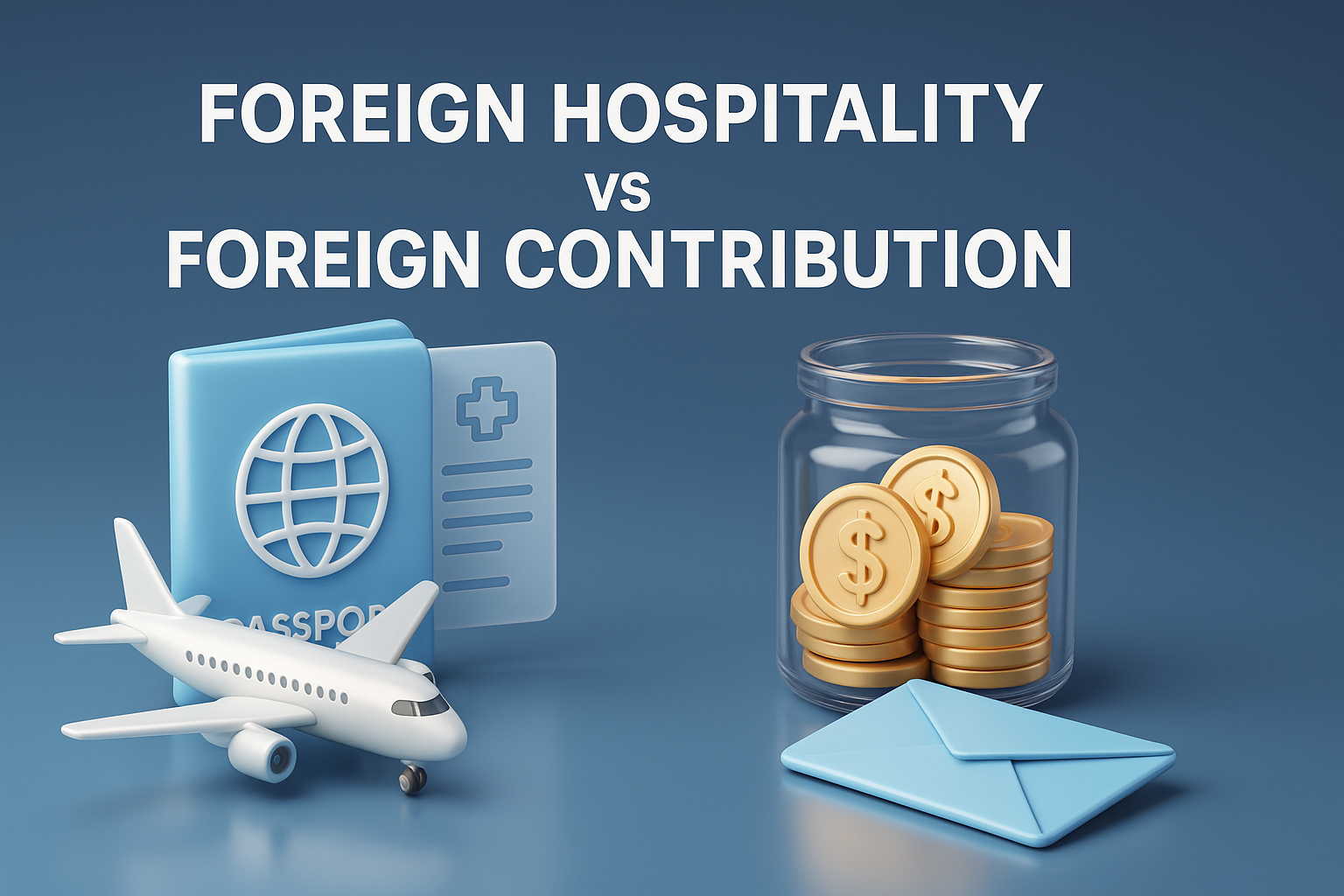
Foreign Hospitality vs Foreign Contribution Clarifying Confusion
Overview
The distinction between foreign hospitality and foreign contributions under the FCRA, 2010, is critical yet often misunderstood, leading to compliance challenges for NGOs. Foreign contributions encompass monetary or material donations from foreign sources, requiring FCRA registration or prior permission. Foreign hospitality, defined as travel, accommodation, or medical treatment provided by foreign entities, is regulated separately but requires prior MHA approval for acceptance by certain individuals, including NGO office-bearers. Confusion arises due to overlapping compliance requirements, as unauthorized acceptance of hospitality can trigger penalties similar to those for foreign contributions. NGOs must clarify these distinctions and ensure transparency to avoid legal repercussions.
Statutory Framework
Section 2(1)(h) of the FCRA, 2010, defines a foreign contribution as any donation, delivery, or transfer of currency, securities, or articles by a foreign source. Section 6, in contrast, regulates foreign hospitality, prohibiting its acceptance by specified persons such as legislators, judges, or NGO office-bearers without prior MHA approval, except in emergencies like medical treatment. Violations of either provision are punishable under Sections 3335, with penalties including fines and imprisonment up to five years. The Income Tax Act, 1961, may treat unauthorized contributions as taxable income under Section 2(24), while hospitality does not typically attract tax implications unless it is deemed a benefit in kind.
Legal and Compliance Implications
Foreign contributions must be received in the Designated SBI account and used for approved charitable purposes, requiring FCRA registration or prior permission. Foreign hospitality, such as sponsored travel or accommodation for NGO members attending international conferences, requires MHA approval via Form FC-2, with exceptions for urgent medical needs. Unauthorized acceptance of hospitality can lead to penalties, including fines or suspension of FCRA registration, and may raise questions about the NGOs compliance with its charitable objectives. The overlapin regulatory oversight creates confusion, necessitating clear documentation and approval processes.
Judicial and Regulatory Insights
The MHAs enforcement actions, such as the 2017 suspension of the Public Health Foundation of Indias FCRA registration for alleged misuse of funds, highlight the governments scrutiny of foreign transactions, including hospitality. The 2022 Supreme Court ruling upholding FCRA amendments emphasized transparency in all foreign interactions, reinforcing the need for MHA approval for hospitality. Regulatory guidelines, such as MHAs clarifications on hospitality, underscore the importance of distinguishing it from contributions to avoid penalties.
Practical Scenarios
An NGOs director is invited to a foreign conference with travel and accommodation covered by a foreign entity. With MHA approval via Form FC-2, the hospitality is compliant. In contrast, an NGO accepts a Rs. 2 lakh donation from a foreign source without FCRA registration, leading to fund seizure and penalties. An other scenario involves an NGO member accepting unapproved hospitality for a training program, resulting in a fine and scrutiny of the NGOs FCRA status. A fourth case sees an NGO correctly distinguishing a foreign grant as a contribution and hospitality as separate, ensuring compliance with both FCRA and MHA requirements.
Common Pitfalls and Mitigation Strategies
A frequent error is assuming foreign hospitality is exempt from FCRA regulations, leading to unauthorized acceptance and penalties. NGOs can mitigate this by seeking MHA approval via Form FC-2 before accepting hospitality. Confusing hospitality with contributions, such as treating sponsored travel as a donation, risks misclassification and scrutiny. Clear documentation of the nature of each transaction prevents this. Inadequate reporting, such as failing to disclose hospitality, invites penalties; NGOs should maintain detailed records and report all foreign interactions. Lastly, neglecting to verify the source of hospitality can lead to violations; confirming the foreign entitys status is essential.
Professional Recommendations
NGOs should seek prior MHA approval for all foreign hospitality using Form FC-2, ensuring compliance with Section 6. Maintaining separate records for contributions and hospitality transactions enhances transparency. Engaging legal experts to clarify the nature of foreign interactions and conducting regular audits ensures compliance with FCRA and Income Tax regulations. NGOs should train staff on FCRA requirements to avoid inadvertent violations and stay updated on MHA guide lines to adapt to regulatory changes. Clear communication with foreign entities about compliance requirements fosters trust and ensures lawful transactions.
Conclusion
Distinguishing between foreign hospitality and foreign contributions is essential for FCRA compliance. While contributions require FCRA registration and a Designated SBI account, hospitality demands prior MHA approval. By maintaining transparency, seeking approvals, and consulting experts, NGOs can navigate these complexities, avoid penalties, and uphold their charitable missions with integrity.
Complete Guide to Form 10A and 10AB– New Compliance Framework for 12AB Registration &nbs...
Latest Rules for Renewal of 12AB & 80G Registrations Under current tax law, registe...
EPF in India is a retirement savings scheme managed by EPFO under the Ministry of Labour and Empl...
Government Grants: An Exhaustive Analysis Under Income Tax Law and Ind AS Framework Government...
What Constitutes “Charitable Purpose” Under Section 2(15)– Judicial Trends and M...
Treatment of NGO Consultancy Income Overview NGOs often augment their resources by of...
Income from Business by NGOs: Section 11(4A) Explained Legal Framework (Sections 11(4) and 11(4A...
Unregistered Trusts under the Income Tax Act, 1961 Legal Framework for Unregistered Trusts ...
BOI (Body of Individuals) and AOP (Association of Persons) are two different terms used in Indian ...
Difference Between Voluntary Contributions, Corpus Donations, and Anonymous Donations I...